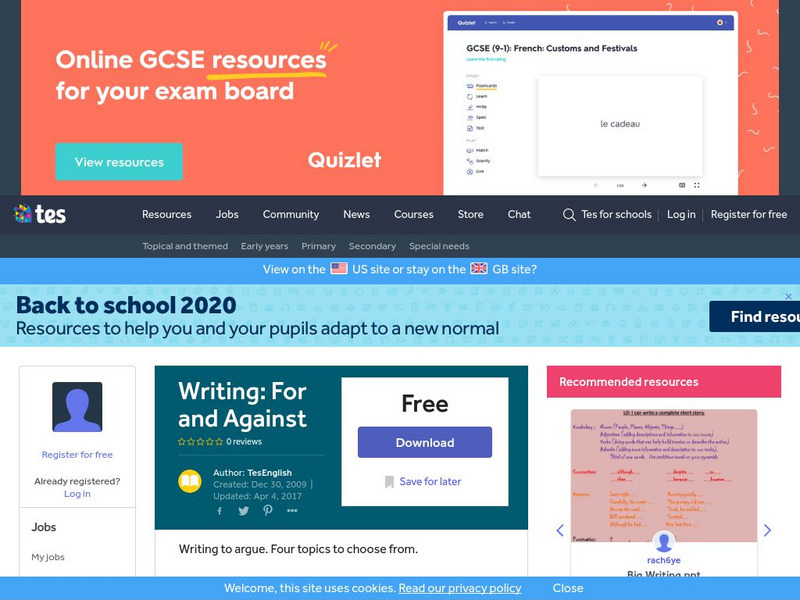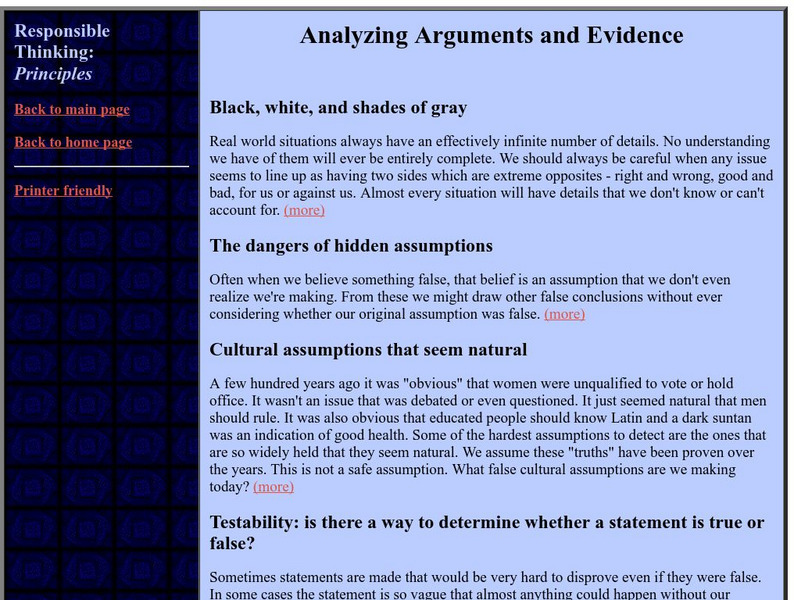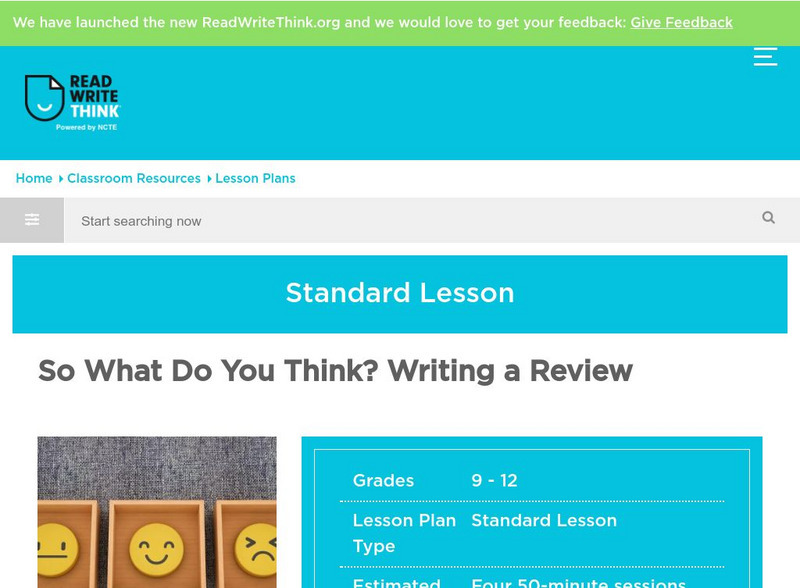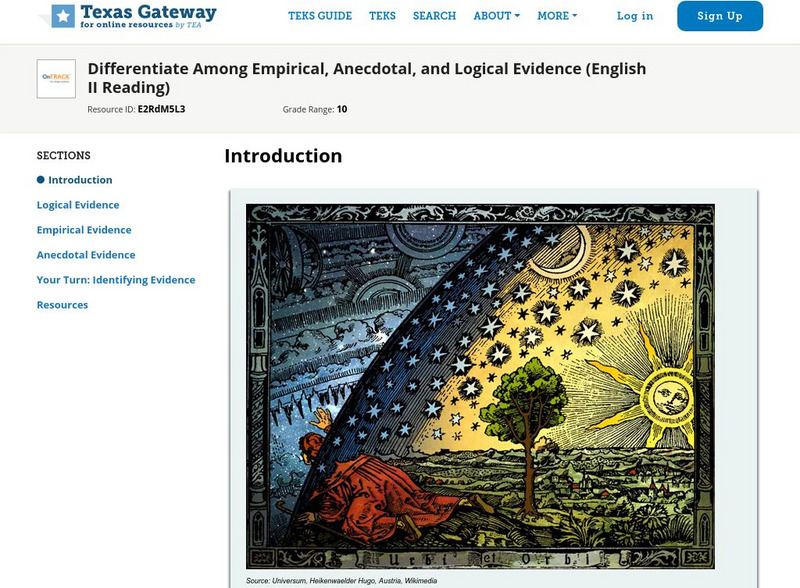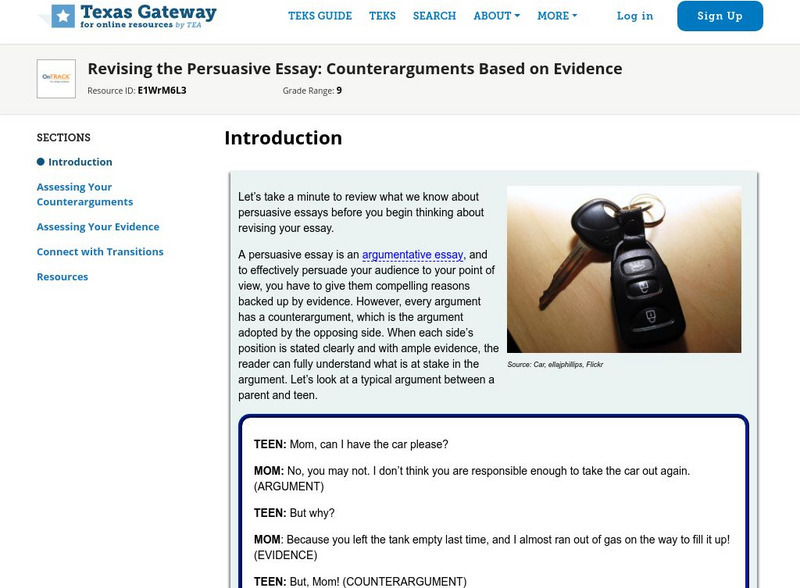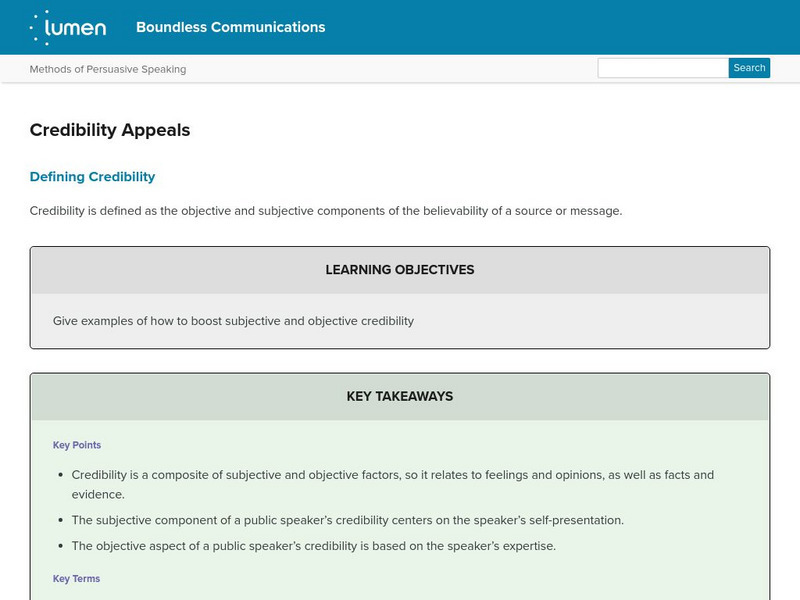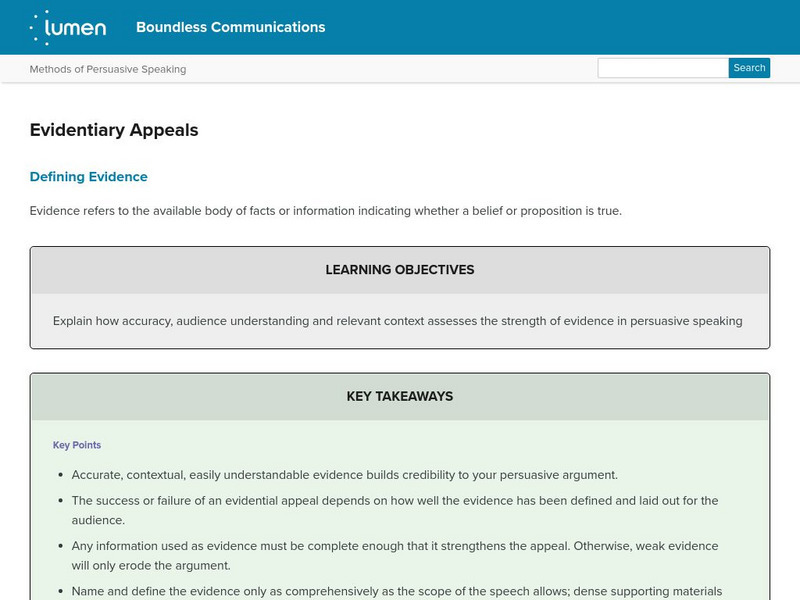E Reading Worksheets
E Reading Worksheets: Fact and Opinion Lessons
In this learning module, students will learn more about the differences between facts and opinions. A PowerPoint presentation and related activity are provided to reinforce the topic of facts vs. opinions. This module is designed to...
TES Global
Tes: Writing: For and Against
[Free Registration/Login Required] This TES resource provides four writing prompts for argumentative essay performance assessments. Teachers can edit the prompts if they choose.
Grammarly
Grammarly Blog: Qualifiers and Quantifiers
An explanation and examples of how qualifiers and quantifiers are used in sentences. Links to additional information are provided.
E Reading Worksheets
E Reading Worksheets: Fact and Opinion: Reading Test 3
A 25-question quiz where students must identify statements as fact or opinion. Results can be printed, saved, or emailed.
Other
Critical Thinking: Basic Questions & Answers
An interesting interview with Richard Paul discussing what critical thinking means. There are many insights as to what critical thinking involves and how it should be used in the classroom.
Other
Becoming a Critic of Your Thinking
This resource presents an article that explains why it is important to be someone who is a good thinker. Provided are four strategies for critical thinking.
Read Works
Read Works: Fourth Grade: Two Lesson Unit: Fact and Opinion
[Free Registration/Login Required] A two-lesson unit on fact and opinion through which students identify facts and opinions in a newspaper article and understand how facts support opinions in an editorial. With free login, users have...
University of North Carolina
University of North Carolina: The Writing Center: Fallacies
Discussion of common fallacies, along with definitions, examples, and tips on avoiding them.
Sophia Learning
Sophia: Elements of an Effective Argument
Discussion focuses on understanding the three academic language objectives that make an effective argument: understand the concept of a thesis statement, the significance of writing an argument with an audience in mind, and the...
Other
Responsible Thinking: Analyzing Arguments and Evidence
Contains many points to consider when analyzing someone's arguments and evidence, such as the hidden assumptions, cultural assumptions, and testability. Each is explained in a short paragraph with a link to additional discussions on...
Grammarly
Grammarly Handbook: Logic in Argumentative Writing
An explanation and examples of several different types of logic that can be used in argumentative writing.
ReadWriteThink
Read Write Think: So What Do You Think? Writing a Review
Contains plans for four lessons that ask young scholars to write critical literature reviews after reading reviews of movies, music, restaurants, and books. In addition to objectives and standards, this instructional plan contains links...
Texas Education Agency
Texas Gateway: Analyze Shifts in Perspective in Informational/persuasive Text
[Accessible by TX Educators. Free Registration/Login Required] Explain shifts in perspectives in the same argument and make decisions about support used in those arguments.
Texas Education Agency
Texas Gateway: Differentiate Among Empirical, Anecdotal, and Logical Evidence
[Accessible by TX Educators. Free Registration/Login Required] Distinguish among different kinds of evidence in a text that supports conclusions and arguments in texts.
Texas Education Agency
Texas Gateway: Analyze an Argument: Practice 1 (English Ii Reading)
Analyze the quality, relevance, and credibility of evidence that supports or opposes an argument.
Texas Education Agency
Texas Gateway: Relevant Information and Valid Inferences (English I Writing)
[Accessible by TX Educators. Free Registration/Login Required] Learn strategies for evaluating and revising an essay so that it contains relevant information and valid inferences.
Texas Education Agency
Texas Gateway: Analyze an Argument: Practice 1 (English I Reading)
Analyze the quality, relevance, and credibility of evidence that supports or opposes an argument.
Texas Education Agency
Texas Gateway: Analyze the Relevance, Quality, and Credibility of Evidence
[Accessible by TX Educators. Free Registration/Login Required] Analyze the quality, relevance, and credibility of evidence that supports or opposes an argument.
Texas Education Agency
Texas Gateway: Revising the Persuasive Essay: Counterarguments Based on Evidence
[Accessible by TX Educators. Free Registration/Login Required] Learn strategies for evaluating and revising counterarguments that anticipate objections in an essay.
Texas Education Agency
Texas Gateway: Revising the Persuasive Essay: Purpose, Audience, and Context
[Accessible by TX Educators. Free Registration/Login Required] Learn strategies for evaluating and revising the organization of an essay, including purpose, audience, and context.
Texas Education Agency
Texas Gateway: Writing Counterarguments Based on Evidence (English I Writing)
[Accessible by TX Educators. Free Registration/Login Required] Write an essay including counter-arguments that anticipate objections.
Lumen Learning
Lumen: Boundless Communications: Credibility Appeals
This lesson plan focuses on using credible appeals in persuasive speeches including defining subjective and objective credibility, the types and elements of credibility, and the ethical use of credibility appeals. CCSS.ELA-Literacy.CCRA.W.8
Lumen Learning
Lumen: Boundless Communications: Evidentiary Appeals
This lesson plan focuses on the use of evidentiary appeals in persuasive speeches including definition, evaluating your evidence, and strategies for using evidence effectively. Click on next at the bottom right to continue.
Lumen Learning
Lumen: Boundless Communications: Logical Appeals
This lesson focuses on using logical appeals in persuasive speeches including inductive and deductive reasoning, inductive reasoning and associative reasoning, forming a rational appeal, and errors in reasoning-formal and informal.



